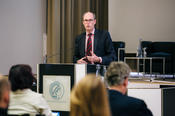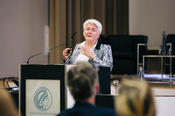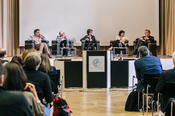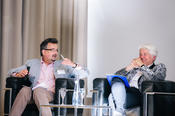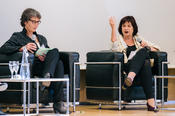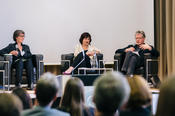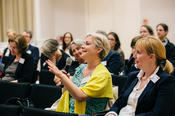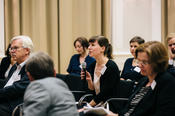Wissenschaft im Dialog mit der Gesellschaft: Neue Perspektiven für den Transfer in den Geistes- und Sozialwissenschaften
Transfer of knowledge is gaining importance in German Higher Education: for universities and research institutions, as well as in science policy and funding organizations. The event on July 7 focused on the significance and prospects of knowledge transfer from the humanities and social sciences. Prof. Dr. Friederike Fless, president of the German Archeological Institute (DAI), Dr. Dagmar Simon of the Berlin Social Science Center (WZB) as well as political scientist Prof. Dr. Thomas Risse and art historian Prof. Dr. Klaus Krüger of Freie Universität were present to speak and discuss. All interested researchers of Forschungscampus Berlin-Dahlem as well as the junior researchers of Junges Wissenschaftsforum Dahlem were cordially invited.
In her introductory speech, Dr. Friederike Fless used the example of archeology to show how strongly knowledge transfer can influence spaces and people: archeological sites replace existing building structures or become tourism magnets, exhibitions shape our impression of other world religions or cultures. In order to deepen the level of exchange with the public, however, the disciplines need to acquire a more profound knowledge of the wishes and expectations of different social groups. At the same time, she emphasized, it is important to maintain a balance between freedom of research and public interest.
The participants of the subsequent panel discussion also highlighted the tension between academic autonomy and political demands for the immediate application of knowledge. According to the political scientist Thomas Risse, who advises the German Foreign Office on strategic approaches in crisis regions, the humanities and social sciences are very interested in an exchange with the public. However, they need to be able to develop the relevant transfer knowledge first. That is why years of research are the basis of qualified transfer offers. In some European countries, Risse explained, the pressure to present results at an early stage has already had a negative influence on academics. His colleague Klaus Krüger, who cooperates with high schools and museums in Berlin, believes that the success of exchange formats strongly depends on how sustainable they are. He added that, unfortunately, the options for long-term funding are still scarce.
The panelists advocated a strongly differentiated approach to the topic of knowledge transfer – regarding both the term itself and the scope of tasks. Social scientist Dagmar Simon warned against designing a model that would do justice to all disciplines. While transfer offices have proven to be valuable for technical disciplines, the exchange in the humanities and social sciences should remain decentralized and be organized by the cooperating researchers. The panel also argued for using the terms dialogue and participation rather than transfer, seeing that it is clearly an equal exchange. All agreed that researchers from the humanities and social sciences don’t simply offer knowledge to the public but seek conversations on an eye-to-eye level with mutual benefits – a good reason for all attendants to continue dedicating themselves to knowledge transfer besides their research and teaching.

